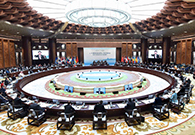Government to improve 'weak links'
By Zhang Yue and Lyu Chang (China Daily) Updated: 2016-09-07 07:16Measures will be put in place by the Chinese government to improve weak links, including poverty alleviation, infrastructure, urban flood prevention and boosting new growth engines to achieve more balanced and effective development.
The decision was made during the State Council executive meeting on Monday, chaired by Premier Li Keqiang, as he heard a report by the National Development and Reform Commission on the country's efforts to improve weak links and measures to be taken down the road.
"The key to expanding demands and creating a proper context for China's structural reform is to improve its own weak areas," Li said. "China is still a developing country with huge development gaps between regions and also between rural and urban areas. We need to work hard to expand effective investment and make stronger efforts at improving weak links."
Improving the country's weak links is one of the major tasks of the 13th Five-Year Plan (2016-20), and was raised during the Central Economic Conference in Beijing in December.
Li said that reducing excess capacity, lowering corporate costs and improving weak links for better livelihoods of the people will be the government's core task in 2016, while maintaining economic growth within a proper range. It also plays an indispensable role in China's structural reform.
"Currently, we are still under pressure to maintain stable economic growth and create jobs, and our achievements in the first half of this year did not come easily," Li said.
Hydro-engineering and urban flood prevention infrastructure will be enhanced, and another 10 new flood prevention projects will be started this year. A total of 800 billion yuan ($120 billion) will be invested in railway construction, and construction of over 2,000 kilometers of underground pipeline will commence this year. Public facilities for the elderly will also be improved. Further support will be offered in developing agriculture, technological and equipment upgrading as well as nurturing new forces to drive the economy.
Also, areas such as civil airports, telecommunication and oil-gas exploration are to be open to private investors.
Han Xiaoping, chief information officer at China Energy Net Consulting Co, an industry consultancy in Beijing, said that bringing in social capital benefits both State and private companies in the field of oil and gas exploration.
"Profits in pipeline construction are very stable with long-term returns, so it is very attractive for privately owned enterprises. Once the capital is injected, it will not only speed up construction of the pipeline network, but it will diversify ownership and promote the efficiency of the total project," he said.
- Government to improve 'weak links'
- Scientists developing multipurpose stratospheric airships
- Action plan aims to reduce new disability cases over next 5 years
- China concerned over downgrade of panda's conservation status
- First lady highlights China's fight against AIDS
- Beijing takes firm stance opposing HK agitators
- Nobel laureate Tu Youyou's team makes new progress on artemisinin research
- Giant panda no longer endangered - WWF
- Action, not words needed to lift economy
- CCDI shows progress in hunt for corrupt officials










